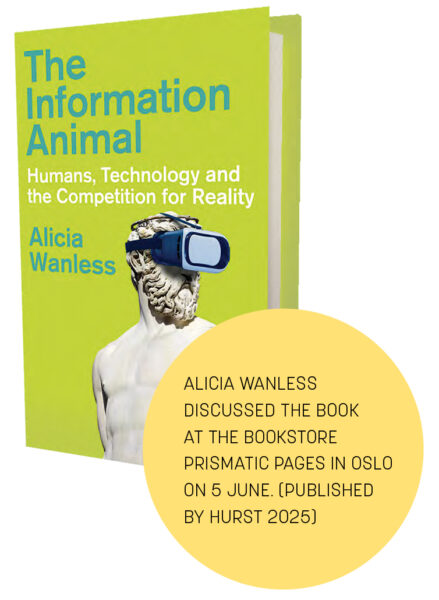Alicia Wanless’s The Information Animal: Humans, Technology and the Competition for Reality delivers a sweeping study of how societies shape — and get shaped by — their information environments.
Mark Knell, Research Professor, NIFU
From ancient Greece to the Cold War and today’s social media battles, Wanless shows how information empowers citizens or serves as a tool of control. Using an ecological metaphor, Wanless casts the information environment as an ecosystem – constantly evolving with innovations such as the printing press, telegraph, and internet, yet always exposed to manipulation, distortion, and decay.
The book grips the reader because Wanless blends history with urgency. She treats misinformation not as a uniquely digital phenomenon but as part of a much longer struggle over who defines truth. Her examples – from abolitionist newspapers to Cold War propaganda and Ukraine’s media under Yanukovych – reveal that information crises recur, even if today’s technologies amplify them at unprecedented speed.
Wanless broadens the lens with case studies of Finland, Ukraine, and Vietnam, showing how politics and technology interact to shape distinct information environments. The settings differ, but the same tensions recur: freedom and restriction, trust and deception, resilience and vulnerability. These patterns reinforce her central point – that information ecosystems are never neutral, but fragile, contested, and deeply political.

Her argument also invites comparison with other theories of technological transformation, such as long wave theory and techno-economic paradigms. In this framework, steam, electricity, and digital networks reorganize economies and institutions through waves of innovation. Wanless, by contrast, focuses on the flows of meaning, narrative, and perception that accompany those shifts. Her account looks less at factories and railroads and more at newspapers, telegraphs, and social platforms.
The two views complement each other. Paradigms explain how clusters of innovation reorder economies, while Wanless shows how they reshape public discourse and collective identity. Schumpeter’s “creative destruction” echoes in her accounts of information upheavals that force societies to adapt. If the paradigm framework offers a structural map, Wanless provides the lived texture of communication, persuasion, and struggle.
Together, these perspectives remind us that revolutions in technology transform not only how we work and produce, but also how we think, argue, and imagine community. By focusing on the information environment, Wanless highlights the cultural side of change.
While she grounds her analysis in past and present struggles, her framework also opens up space to ask what lies ahead. As debates about an emerging quantum revolution gather momentum – with the promise of automating cognitive tasks and reshaping global power– the need to understand how information ecosystems adapt becomes more urgent than ever.
The Information Animal is dense but rewarding—a book for scholars, policymakers, and curious readers who want to grasp how power, truth, and technology collide in the digital age.
Published on 29 May 2025, Alicia Wanless discussed the book at the bookstore Prismatic Pages in Oslo on 5 June.
Alicia Wanless is the director of the Information Environment Project at the Carnegie Endowment for International Peace.
Foto: Lindsey Gibeau and Hurst

